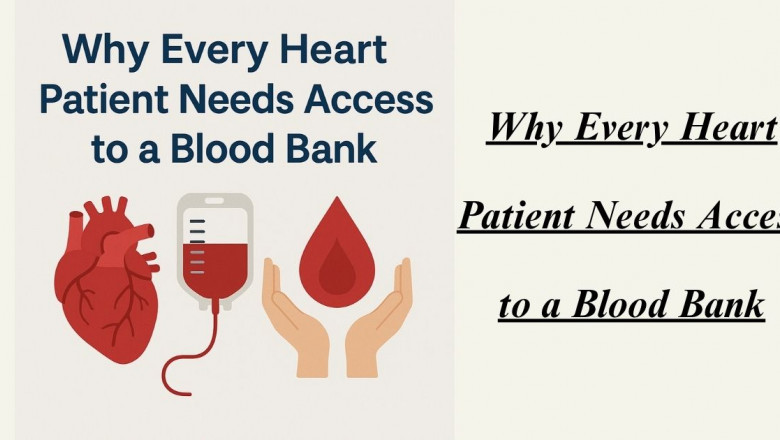views
When it comes to managing heart disease, access to immediate and reliable medical support can make the difference between life and death. One often overlooked but critical component of this support is a blood bank. Whether it's for emergency surgery, routine cardiac procedures, or managing complications like anemia, timely access to blood can save lives. For those seeking quality cardiac care, finding a reliable blood bank in Chennai becomes as important as choosing the right hospital or doctor.
The Critical Role of Blood in Cardiac Care
Heart patients are often vulnerable to conditions that require blood transfusions. These include:
- Open-heart surgeries like bypass or valve replacement
- Post-operative bleeding
- Blood thinning medications leading to complications
- Anemia due to chronic illness
- Emergency situations like heart attacks requiring surgical intervention
In each of these scenarios, a delay in receiving compatible blood can compromise outcomes. This is why having access to a well-equipped blood bank is crucial, particularly in busy cities like Chennai where the fast pace of life and heavy traffic can cause delays in treatment if not managed properly.
Cardiac Surgeries and the Need for Blood
Cardiac surgeries are complex and often lengthy. Some of the processes like coronary artery bypass grafting (CABG) or valve replacements, patients might encounter significant blood loss. While surgeons take all precautions, blood transfusion is frequently required to maintain the patient’s blood volume and oxygen-carrying capacity.
Even minimally invasive procedures carry some risk of blood loss. In many cases, cross-matching and preparation for possible transfusion are part of the standard preoperative process. That means the hospital must have quick access to a reliable supply of various blood types. A trusted blood bank ensures that this supply is available without last-minute hurdles.
Managing Emergency Cardiac Events
Heart attacks or acute heart failure often require immediate intervention. In critical moments, every second counts. Imagine a patient is quickly brought to the emergency department experiencing a heart attack and requires immediate surgery. If the patient’s hemoglobin is low or there’s internal bleeding, the surgical team cannot proceed without arranging for blood.
Having a functioning blood bank within or near the hospital drastically reduces the waiting time. It ensures that cardiac procedures aren't delayed and gives patients a higher chance of recovery. Many modern hospitals in Chennai integrate their facilities with on-site or nearby blood banks to provide this level of care.
Chronic Conditions and Anemia in Heart Patients
Many heart patients, especially the elderly or those with chronic heart failure, also suffer from anemia. Anemia reduces the amount of oxygen that red blood cells can carry to tissues—including the heart itself. This puts extra strain on the already weakened heart and increases the risk of complications.
Treatment of anemia in heart patients often involves iron supplements, dietary changes, and in more severe cases, blood transfusions. Especially during episodes of acute decompensation (when symptoms suddenly worsen), transfusions can stabilize the patient. Again, quick access to compatible and safe blood products from a trusted blood bank can prevent hospital readmissions and improve quality of life.
Post-Operative Care and Blood Transfusions
Even after a successful heart surgery, the road to recovery may include the need for additional blood support. Sometimes, due to the patient’s age or existing health conditions, they may experience delayed healing, internal bleeding, or further drop in hemoglobin levels.
In such cases, a blood transfusion post-surgery helps to rebuild strength and support the healing process. This emphasizes the importance of continuous access to blood banks—not just during the operation, but throughout the recovery period.
Quality and Safety of Blood Matters
It’s not just about having blood available; the quality and safety of the blood matter just as much. Cardiac patients often have compromised immunity or coexisting conditions that make them vulnerable to infections. Blood from an unreliable source can carry risks such as:
- Mismatched transfusions
- Transfusion-transmitted infections (like HIV, Hepatitis B/C)
- Low-quality storage affecting red cell integrity
A reputed blood bank in Chennai follows stringent protocols for donor screening, blood testing, storage, and transfusion. This gives patients and their families peace of mind and ensures the highest safety standards are met.
Coordinated Care with Cardiologists and Hospitals
The best outcomes for heart patients come from coordinated care. A best cardiologist in Chennai will not only diagnose and treat the heart condition but also ensure that all support systems—including blood supply—are seamlessly integrated.
Often, cardiologists collaborate closely with hospital blood banks to ensure every patient has pre-planned access to blood, especially in surgical or high-risk cases. Such teamwork ensures smoother patient journeys and improves overall treatment success.
Community Support and Blood Donation
Blood banks don’t operate in isolation—they depend on the community. Encouraging voluntary blood donation can go a long way in maintaining a steady supply, especially for rare blood groups. Heart patients who benefit from transfusions today may inspire others to donate, creating a cycle of goodwill and survival.
Hospitals and NGOs in Chennai regularly organize blood donation camps, spreading awareness about how donated blood helps cardiac patients and others in need. By supporting these efforts, the community plays a direct role in saving lives.
Conclusion
Heart diseases demand a multi-pronged treatment approach—diagnosis, medical management, surgery, post-operative care, and emergency intervention. Access to a reliable blood bank is a cornerstone in this entire spectrum, ensuring that no life is lost due to unavailability of a simple yet vital resource: blood.
For heart patients and their families, knowing that they are close to a safe, accessible blood bank provides immense reassurance. Combined with expert care from trusted cardiologists and hospitals, it becomes a key factor in the journey toward recovery and better heart health.













Comments
0 comment